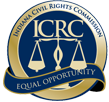Since its founding, changes in Indiana civil rights laws have altered and expanded the mandate of the Indiana Civil Rights Commission (ICRC). First created as the Indiana Fair Employment Practices Commission in 1961, the agency lacked the ability to enforce its decisions and was limited in scope to employment matters. Over time, the legislature expanded the covered areas and protected groups as well as granting the agency the authority to ensure compliance. Currently, the Commission is vested with the power to issue orders, subpoena witnesses and award damages.
The Fair Employment Practice Act of 1961 was expanded in 1963 into Indiana civil rights laws. Consequently, the Fair Employment Practices Commission was changed to the ICRC, with powers of enforcement over the areas of employment, education and public accommodations.
The Commission's jurisdiction continued to expand over the next ten years. Housing was added in 1965. Gender discrimination was included in the Indiana statute in 1971. Three years later, discrimination in granting credit was added to the agency's jurisdiction. Subsequently, in 1975, persons with disabilities were added as a protected class.
Recent legislation has continued to modify and expand the role of the ICRC. In 1991, the legislature amended the Indiana civil rights laws to comply with the enforcement provisions of the federal Fair Housing Act. These amendments expanded protections for Hoosiers by extending coverage to families with children, providing fines, civil penalties, injunctive relief and (for victims of housing discrimination) the right to elect agency or judicial enforcement of claims.
Enacting the Indiana Fair Housing Act and promulgating rules and regulations were part of a process that allowed the agency to be certified as a substantially equivalent fair housing enforcement agency with the U.S. Department of Housing and Urban Development (HUD). The Indiana Fair Housing law prohibits activities like blockbusting and discriminatory advertising which have the effect of making it harder for a person to live in a neighborhood or individual housing unit of their choice. This legislation enabled the ICRC to share jurisdiction with HUD and receive funding. In 1996 funds from HUD totaled $324,120.
Similarly, the Hoosiers with Disabilities Act passed the legislature in 1992. The act amended Indiana civil rights law to comport with the Title I of the federal Americans with Disabilities Act (ADA). Like its federal counterpart, this law ensures that individuals are not denied equal opportunity in employment because of disability and further requires employers to reasonable accommodate individuals with disabilities.
Although the term "reasonable accommodation" encompasses a myriad of possible modifications an employer might be required to make, it is tempered by the limitation that an employer is not required to make modifications that would impose "undue hardship" on its business. The Commission has the authority to enforce this law and promulgate rules for implementation of the law.
Along with new laws that have changed the ICRC's jurisdiction, new legislation has been enacted which affects its operation. In 1993, the agency proposed and the legislature passed House Enrolled Act 1509. The act changed several aspects of adjudicating a case with the Commission. The designation of "hearing officer'' was changed to "Administrative Law Judge." The change is meant to bestow an enhanced perception of the dignity and significance of the office as well as Commission proceedings. This classification is similar to other administrative agencies that have quasi judicial powers. Also, the act enlarged the statute of limitations for filing a complaint of discrimination from 90 to 180 days.
In 1994, legislative changes included enactment of two laws which reformed the agency's jurisdiction over a case. The law was changed to allow any civil rights case to be heard in a trial court with the agreement of both parties and to have judicial review of Commission decisions by the Indiana Court of Appeals. Previously, the right to choose whether to have an administrative hearing with the Commission or opt for a more formal trial was available only in housing discrimination cases. The legislature extended this right to all areas covered by Indiana civil rights laws. Prior to the new law, judicial review of ICRC decision was conducted first by local trial courts and then appealed to the Indiana Court of Appeals. The agency noted that trial courts are not staffed to review decisions in an efficient manner. By directing the reviews straight to the Indiana Court of Appeals, a three and a half year delay in achieving appellate court review was eliminated.
Legislative endeavors in the last two years have included, modifying Commission time frames to accommodate mediation occurring during an investigation to allow parties to attempt conciliation before choosing a forum for adjudication of their complaint. These legislative measures have streamlined the ICRC's complaint, investigative and adjudicatory processes.
